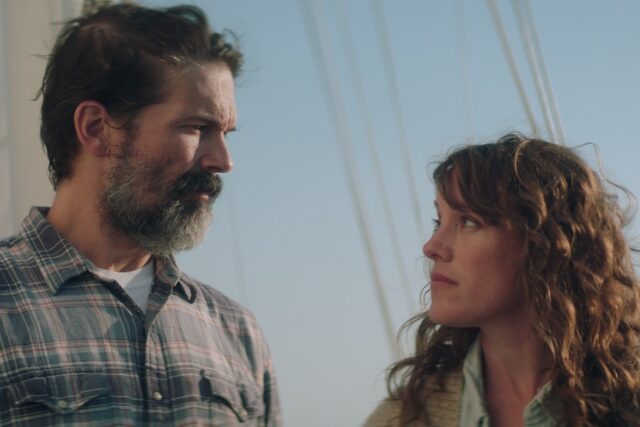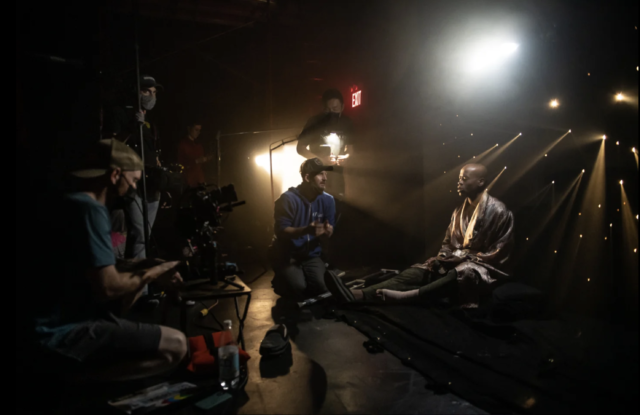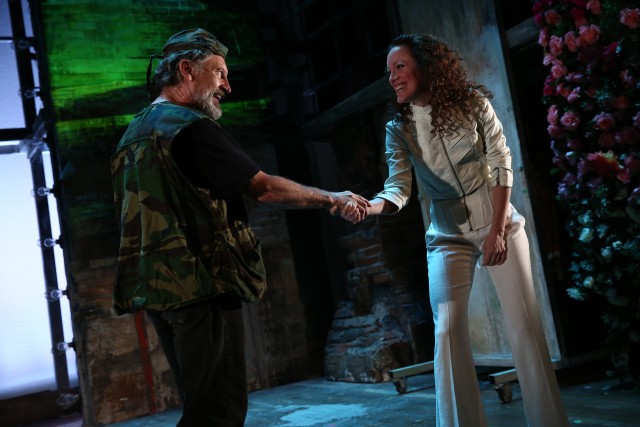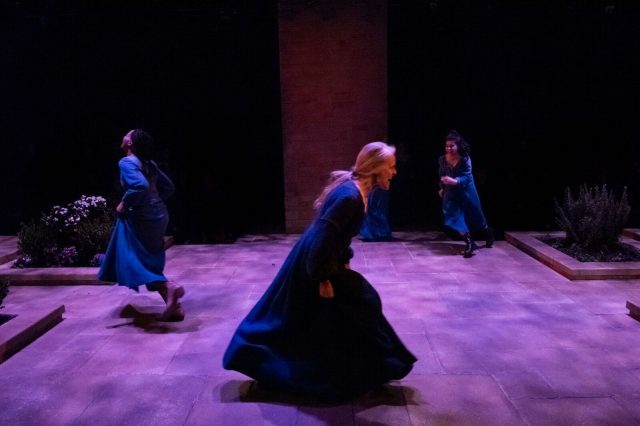
A group of women seek answers about their unhappy lives in The Convent (photo by Ahron R. Foster)
THE CONVENT
Mezzanine Theatre at A.R.T./New York Theatres
502 West 53rd St. between Tenth & Eleventh Aves.
Tuesday – Sunday through February 17, $45
weathervanetheater.org
www.rattlestick.org
In the world premiere of Jessica Dickey’s The Convent, which opened last night at A.R.T./New York Theatres, six nondenominational spiritual seekers, all women, go on a weeklong retreat to find out who they are and what they want in life. In the world premiere of Coral Cohen’s Between the Threads, which opened tonight at HERE, five Jewish women talk about the limitations of growing up female in a religious tradition that limits their freedom to determine their own identity. There are numerous intriguing similarities between the two superb plays, from the very outset. In Between the Threads, the women are informally chatting with one another as the audience enters the space, the stage dotted with knitted dreamcatcher-like objects referencing weaving, which is traditionally considered women’s work, while in The Convent, one of the women is sweeping up leaves as the audience comes in; she then sits down and starts to sew. Both works also examine matriarchal lineages and the relationship among daughters, mothers, and grandmothers.
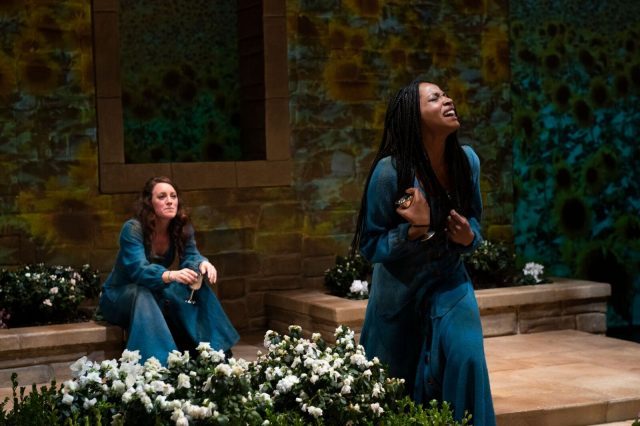
Patti (Samantha Soule) watches Jill (Margaret Odette) express herself in new Jessica Dickey play (photo by Ahron R. Foster)
“I remember when I first climbed those stairs. I was penniless, lost, exhausted, but more than that — I was spiritually bankrupt,” Mother Abbess (Wendy vanden Heuvel) says after a new group of women enter the courtyard of the Convent. “No matter what has brought you, what you sacrificed to get here — no matter your past, your beliefs, if you’re rich or broke, thanks to the support of a generous few — you are welcome here.” Jill (Margaret Odette), Wilma (Lisa Ramirez), Tina (Brittany Anikka Liu), and Patti (Samantha Soule) have joined Dimlin (Annabel Capper) and Bertie (Amy Berryman) in the south of France, seeking insight into their lives. They all don similar long blue robes and share intimate details about themselves, filtering them through the nomen card they each select from a deck of female saints. (Nomen is Latin for “name,” but it also can be read as “no men.”) For example, Jill picks Teresa of Avila, Patti chooses Mechthild of Magdeburg, and Dimlin gets Catherine of Siena.
Each day is filled with chores and rituals, prayers and discussion sessions. While some of the characters are free and open, others are more tightly wound and self-protective; there is also a fierce tension between Patti and Mother Abbess. “You’re trespassing, you are not welcome at this retreat,” Mother Abbess tells the snarky Patti, who responds, “Now where’s the fun in that?” Mother Abbess strongly retorts, “I will do it. They’ll drag you cuffed and screaming. Don’t you dare fuck this up for this group of women.” They might be in a convent praying regularly to God, but this is no typical house of worship. In fact, Mother Abbess surprisingly declares, “I never liked church. I hated being told what to say, I hated being talked to through the words ‘he’ and ‘mankind.’ I felt like spirituality was this little peephole I was allowed to look through, into this room that other people got to be in. But spirituality is exactly what I was seeking. Sovereignty. True sovereignty.” Of course, not everyone gets what they were seeking.
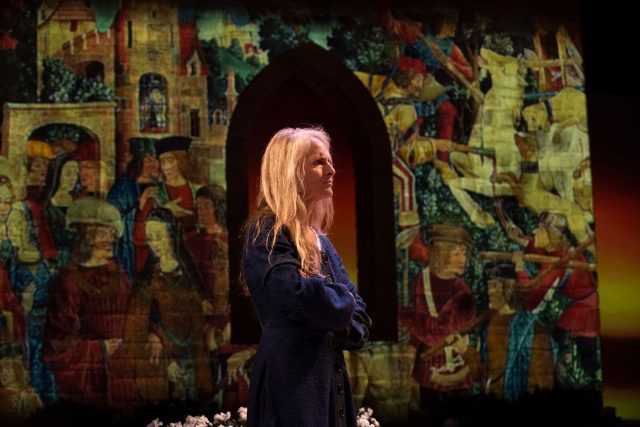
Mother Abbess (Wendy vanden Heuvel) faces her own demons in The Convent (photo by Ahron R. Foster)
Evoking Small Mouth Sounds, in which a diverse group of people join a silent retreat, The Convent takes place in the middle of the theater, the audience sitting on either side of Raul Abrego’s long, narrow, horizontal stage, which features medieval-style architecture and several plantings. The cast, wearing Tristan Raines’s costumes, often carries chairs on and off the concrete patio during prayers and discussions; Katherine Freer’s projections depict flowers blowing in the wind outside as well as Middle Ages paintings. Soule has the meatiest part, and she tackles it with relish as her character chortles, rolls her eyes, flirts with others, and often stands alone. Odette is excellent as Jill, a married woman with deep wounds, and vanden Heuvel (the artistic director of Weathervane Theater, which is presenting the play with Rattlestick) nails Mother Abbess, who harbors some dark secrets of her own. Dickey’s dialogue crackles with truth while Daniel Talbott’s direction is both warm and energetic.
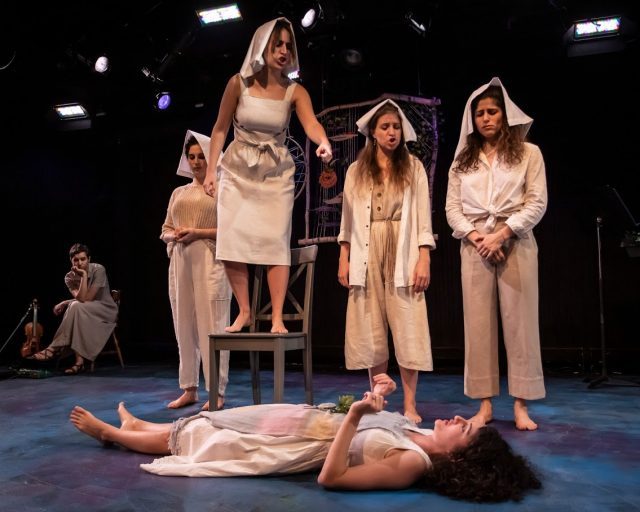
Cousins gather for a bat mitzvah in Coral Cohen’s Between the Threads (photo by Emily Hewitt)
BETWEEN THE THREADS (JEWISH WOMEN PROJECT)
HERE Arts Center
145 Sixth Ave. at Dominick St.
Wednesday – Sunday through February 10, $25
212-647-0202
www.here.org
www.facebook.com
Truth is also central to Between the Threads (Jewish Women Project), in which co-creators Hannah Goldman, Lea Kalisch, Luisa Muhr, Daniella Seidl, and Laura Lassy Townsend essentially play themselves, telling their personal stories about the impact the Jewish religion has had on who they are and who they want to be. Hailing from the Ashkenazi, Sephardic, and Mizrahi traditions, they are joined by klezmer musician Zoë Aqua, who sits in a far corner playing the violin. “It’s not fair that people grow up. It’s not fair that you suddenly have to have your bat mitzvah and suddenly become a woman now and suddenly you can’t play with us,” Daniella says to Laura, adding, “Eventually, we will join your side for a lifetime of suffering. We too will become women.” The five women wear similar types of white or off-white clothing, either a skirt, a dress, or pants, and all are barefoot. (The costumes are by Johanna Pan, with set design by Lauren Barber.) The women prance about the stage fancifully, move about chairs to sit or stand on, and occasionally sing and dance as they relate the feminine aspects of their heritage, even including snippets of their mothers and grandparents talking.
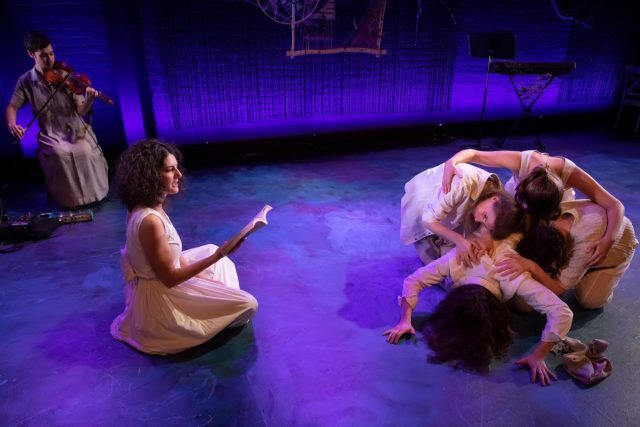
Laura Lassy Townsend reads as Zoë Aqua plays the violin and the other women come together in world premiere at HERE (photo by Emily Hewitt)
The young women discuss immigration, rituals, weddings, funerals, the Torah, Christmas, and the mechitza, the partition that separates the men from the women in Orthodox synagogues. “I dream of a world without barriers. Where everyone has space. Where everyone has freedom,” Hannah says, while Lea explains, “I love the mechitza — it makes me feel more woman.” Lea, who previously described herself as a rebel, also says, “I am a twenty-first-century woman / I am in charge. . . . I’m yearning to be where the men are / as a man / Yearning for a dream / Is that what it means to be a Jewish woman? / I want to be where the men are / Want to feel like they feel,” getting right to the heart of the conflict within each of them. Throughout the seventy-five-minute show, the women make direct eye contact with the audience, reaching out for catharsis, and it’s easy to respond to them as they lay their feelings bare with humor and intelligence. In some ways they recall Tevye’s daughters from Fiddler on the Roof, trying to find their place in Judaism and the world outside. It’s no simple task; it might be a matrilineal religion, but it’s still the men who call the shots in the more fundamentalist branches.
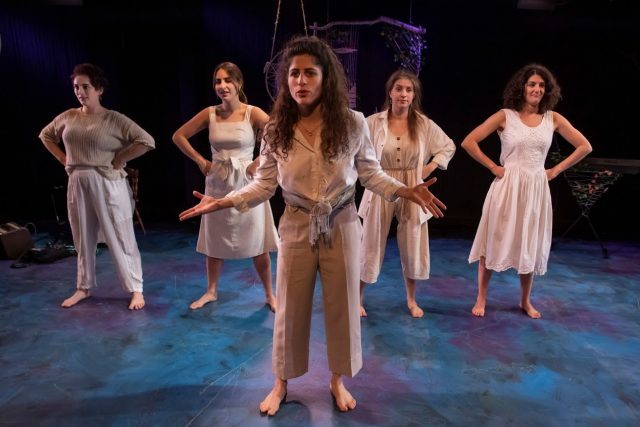
Lea Kalisch is one of five women who share intimate details of their lives from the Jewish Women Project (photo by Emily Hewitt)
The Convent and Between the Threads are both in harmony and counterpoints to each other. (They are also both general admission seating and performed without an intermission.) Each focuses on women’s identity in contemporary society and how faith and family impact that. Each show includes singing — in The Convent it’s a Madonna song, of course — as well as same-sex relationships. They also look at the concept of God and the power of motherhood; specific men are rarely mentioned. In Between the Threads, Luisa says, “My religion is culture, is art. I found Judaism through music. My mother found Judaism through music. You can’t silence music and you can’t silence the voices that sing it. We break down the bars. We break down the walls. And yes, we break the male gaze.” In The Convent, Mother Abbess explains, “Women cannot follow men. They can learn from them, they can partner with them, but they cannot follow them. . . . A woman can only follow herself. Which means a woman must lead herself. Which means a woman must always strive to be both — the one who is following, and the one who is leading.” The primary difference between the two shows is that in The Convent, the characters are hurt and angry, severely disappointed with their lives, but in Between the Threads the women are joyous and happy even as they grapple with disturbing aspects of their religion. The women in Between the Threads are not in need of a spiritual retreat, nor would the women in The Convent likely find the answers they are seeking in Judaism.
